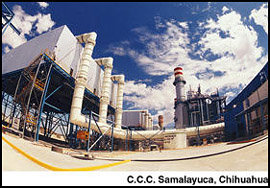 The
Energy Sector: Powerhouse of the future The
Energy Sector: Powerhouse of the future
The energy sector, also a target of liberalization, has remained on the forefront of the government's economic agenda. One of President Zedillo's main political agenda during his term was to push for restructuring within the electricity sector.

Along with Energy Minister, Luis Tellez , Zedillo sees the reform as a way to bring private capital into a sector which is in need of funds to increase production. The government will spend about $4.5 billion on the electricity industry this year, according to Tellez, much of which is financed through the leveraging of the national electricity monopoly, the Federal Electricity Commission (CFE) . Not only is a limit to the debt the government can subscribe to coming to a head, but industry analysts say in five years, the current generation capacity will not meet the needs of a growing population. Restructuring would transfer some assets in the generation area from public to private ownership, yet, the proposal has met with relentless resistance in Congress, which for the first time in the PRI's 71 years of imperialism, is dominated by opposition legislators. The proposal so far, has not been passed, but Tellez says he expects it to go through before the year's end. The financial situation surrounding the issue, Tellez asserts, means it will pass sooner or later. "It would give the new administration an enormous boost in terms of economic expectations and credibility," he quipped, as well as have a positive impact on the investment grade and status of Mexico. And it will provide investors yet another open door to enter Mexico, who should be on the lookout, Tellez warns. Once the proposal is passed, things will move rapidly, he said.

Regardless of these setbacks, currently opportunities to invest in electricity generation are available. Possibilities exist for private companies to set up shop to generate electricity, which they in turn are required to sell via the national grid to the CFE. The CFE also requests the companies to make investments of $4-5 billion per year. Some major foreign companies have already taken up the offer, such as Electricité de France, with two major projects, Mitsubishi of Japan has two to three projects afoot, and Spain-based Iberdrola is working on two major projects. Many U.S. and Canadian developers are also entering the increasingly competitive market, but the new EU-Mexico Free Trade Agreement should ensure a greater influx of Europeans. The agreement includes a section that provides incentives to especially bring capital into the Mexican energy sector.

|
And the CFE is also hosting a series of road shows in Europe to court new investors from the United Kingdom, Italy and Germany, who are not yet present in the Mexican market, CFE General Director Alfredo Elias Ayub pointed out. Even a change in power with the elections will not derail these initiatives, he said. With projects that take at least two years and large investments to complete, the foreign participants are making a long-term bet that economic stability will continue as a new president takes office. "The real reason for change in the sector is the emergence of the global business community which has created a more competitive market for the supply of electricity," Elias said.
Initiatives to grant private permits for gas distribution have also met with success. The Zedillo government was able to open up a part of the gas industry: the transportation, distribution and storage of natural gas. Since 1995 the amount of private investment in the sector has exceeded $2 billion, allowing Mexico's main industrial centers and cities to have access to gas. U.S. and European companies have shown particularly strong interest in gas transport and distribution, Trade Minister Blanco quoted, Gas de France and Gas Natural of Spain to name a few. The drive to promote natural gas use has also received approval by lawmakers concerned for the environment. Since pollution has been a chronic problem in many of the country's industrial centers, clean-burning gas is a good start to offer a solution.
 Mexico´s
Black Gold at the Center of Controversy Mexico´s
Black Gold at the Center of Controversy

By contrast, Zedillo and Petroleos Mexicanos (Pemex ) Director General Rogelio Montemayor at the oil company's 62 anniversary in March omitted any mention of privatizing what continues to be considered as the nation's sacred patrimony. Since it was nationalized under President Lazaro Cardenas in 1938, driving U.S. and European owners out, Pemex stands by patron saint the "Virgen of Guadalupe" (according to presidential candidate Vicente Fox of the PAN) as a sacred national symbol.
And while Tellez and former Pemex Director General Adrian Lajous tossed around the notion of privatizing at least the petrochemical sector of the oil-producing mammoth, the new director has reverted back to old-guard doctrines. Pemex will remain in government hands, but will be made more efficient, and will have standards comparable to international oil companies. How the government plans to attain the improvement in quality and efficiency under such a restrained system remains to be seen. In reality, Pemex could use not only the funds but also the know-how from the outside. Despite such resistance, debate on privatizing has not subsided so easily, since experts point out the raw petrochemicals the nation imports are largely responsible for the trade deficit, which is most ironic, since the nation has the primary materials but not the producing facilities to make the secondary materials in house. "The structural reforms bring benefits to the national companies in terms of investment, job creation, economic growth and competitiveness, and therefore the Mexican government must continue with its strong commitment in this area," Tellez stated. Should Congress and political pandering ever let up on the opening up of the oil sector, the petrochemicals branch will be a treasure trove of investment opportunities. Pemex was and will continue to be the cash cow of the nation. Once the source of almost 70% of the nation's GDP, politicians know sentiment of the general populous still holds that selling rights to foreigners is sacrilegious. It is still an important part of the budget. Mexico has enjoyed the nine-year highs of oil prices, in large part because of the output limit organized by Tellez with OPEC nations and Norway. Though Mexico is not an OPEC member, it is an important exporter of oil to the United States. Calculated to average at $16 a barrel for this year's budget revenues, Mexico's black gold still goes a long way. |

